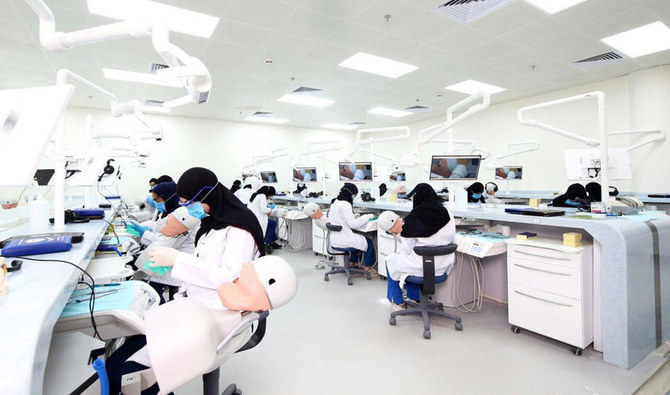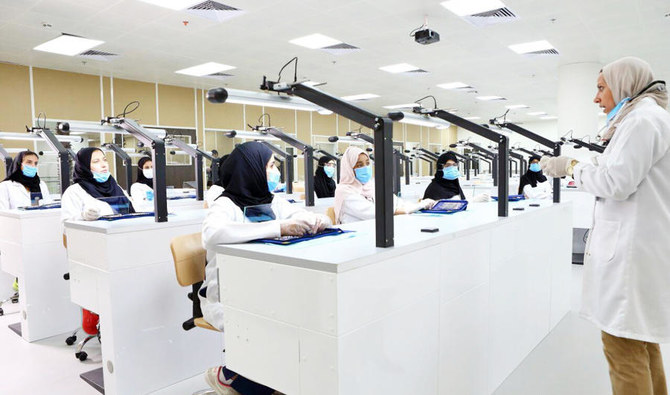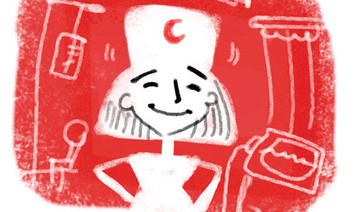DUBAI: Health chiefs in Gulf countries must take steps to make nursing and midwifery more attractive careers to address a shortage of trained professionals, according to experts. The advice comes as new figures reveal that Saudi Arabia needs to fill tens of thousands of posts over the next decade to cope with rising demand.
According to advisory firm Colliers International, the Kingdom will require 33,000 nursing professionals by 2030 as an expanding and ageing population places increasing burdens on its health care system.
That prediction is much higher, however, in the context of the Saudi government’s intention to attract more nationals into medical jobs within the next five years, according to Mansoor Ahmed, director for health care and education at Colliers.
“The greatest challenge remains that in order to meet the government’s Saudization goals, the Kingdom will need an additional 82,000 Saudi nurses in the country over the next decade,” Ahmed told Arab News. “The country’s Vision 2030 Reform Plan aims to increase the attractiveness of the nursing and medical support professions. Saudis make up just over a third of the total workforce.”
The Kingdom must hire more than 20 Saudi nurses every day until 2030 to cope with both rising demand and its “Saudization” goals.
Despite the profession’s importance in frontline medical care, nursing and midwifery are still unpopular careers for people from the Kingdom and in the Gulf Cooperation Council (GCC) region.
Ahmed said low pay, a lack of medical colleges and universities to train homegrown talent, and high work pressure are some of the reasons too few Saudis look at nursing as a career choice. As a result, the Kingdom relies on a large number of expatriates to fill posts.
The number of nurses per 1,000 people in Saudi Arabia (5.5) is the second highest in the GCC after Kuwait (6.4). However, in terms of the ratio of nurses to hospital beds, the Kingdom has one of the lowest in the GCC region — 2.5 nurses per bed compared with a GCC average of 2.8 nurses per bed, according to Colliers. This contrasts with 3.1 nurses per bed in the UK and 4.1 nurses per bed in the US.
“Similar to most of the countries in the world, Saudi Arabia is experiencing a nursing shortage, especially from Saudi nationals and women,” Ahmed said. “Expatriate nurses form a large proportion of the nursing workforce in the Kingdom’s health care facilities, with Saudis comprising only 38 percent of the total nursing workforce.”
Ahmed added that research and studies have linked the shortage of Saudi nurses to sociocultural factors, notably the profession’s perceived low status and the long working hours.
“Many Saudi families do not view afternoon and night shifts as desirable due to their social lives,” said Ahmed. “Also, female nurses are required to work with male health care professionals or male patients. This clashes with the gender-segregation norms of many Middle Eastern countries.
“Lower wages are another problem as nurses feel that they are not remunerated adequately for their work, especially since they sometimes toil in high-risk conditions.
“The nursing shortage can be further attributed to factors such as increased demand for health care due to advances in medical technology, population growth, rising life expectancy and larger numbers of chronically ill patients.”
Since Florence Nightingale pioneered modern nursing in the 19th century by organizing care for wounded soldiers during the Crimean War, nurses have played a critical role in health care. Today, they comprise a huge section of the global medical profession.
The World Health Statistics Report says that there were an estimated 29 million nurses and midwives in the world in 2013. Considering that up to one million additional nurses will be needed by 2020, experts say governments around the world should take steps to fill the shortfall if the quality of health care provision is to be maintained.
Rafik Karkout, director of nursing at the UAE’s Bareen International Hospital, said the staffing shortage in Saudi Arabia is not unique to the region.
“Health care organizations around the world are facing a challenge in dealing with higher patient loads and limited nurses,” he told Arab News. “Shortage of nurses is one of the most pressing issues for all countries.”
FASTFACT
• 33,000 - Saudi Arabia needs an additional 33,000 nursing professionals by 2030
• 50% - Nurses and midwives form nearly 50 percent of global health workforce
• 70% - Women account for 70% of health and social workforce globally
• 9m - World will need an additional 9 million nurses and midwives by 2030
Karkout added that developing countries face even more daunting challenges in this regard due to limited infrastructure, inaccessibility to proper education, and the aggressive recruitment policies of medical facilities in North America, Europe and the Arab Gulf countries.
According to Karkout, the problem is worsened by the “growing number of patients with chronic conditions such as diabetes, cardiovascular diseases, and cancer, all who require more nurses in the process of treatment.”
Karkout said a shortage of nurses will inevitably lead to a decrease in the quality of health care, which will affect patient care and safety.
The shortfall in the number of midwives in the Gulf region is another aspect of the problem with recruiting nurses from the local population, according to Karkout.
“A student needs to complete a three to four-year academic program to qualify to become a registered midwife. The curriculum is challenging. Yet the salary range is not as rewarding as one might expect it to be,” he told Arab News.
Karkout added that GCC countries rely on a transient expatriate workforce to fill nursing positions instead of training and recruiting nationals to do those jobs.
“Most nurses and midwives are being recruited from Asia, Africa and other Arab countries,” he said.
As with nursing, misconceptions about a career in midwifery are common in GCC countries, said Karkout.
Ahmed added that while nursing in Saudi Arabia “has advanced noticeably in education and clinical practice,” there are challenges to sustaining a Saudi nursing profession and workforce.
“However, the Vision 2030 offers many opportunities for social and economic transformation in order to advance the nursing profession, thereby improving health care delivery in the Kingdom,” he said.
“Solutions should be aimed at improving the public image of nursing through education and supporting aspects of our culture which make working in nursing more compatible with being a Saudi national. This is in line with the Vision 2030 plan of increasing the attractiveness of nursing and medical support staff as a preferred career path.
“The Kingdom also needs more medical colleges and universities to train homegrown talent, and to offer financial incentives for those specializing in health care. More incentives, such as easing visa regulations, can be considered as ways of attracting and retaining overseas expertise.”
Karkout said people should be aware that nursing is a scarce skill.
“All professions are important but nursing requires not only technical skills but also warmth and sincerity in providing care for patients and dealing with their families,” he said. “Nursing is a noble profession that gives pride and honor to those who practice it with passion.”


















